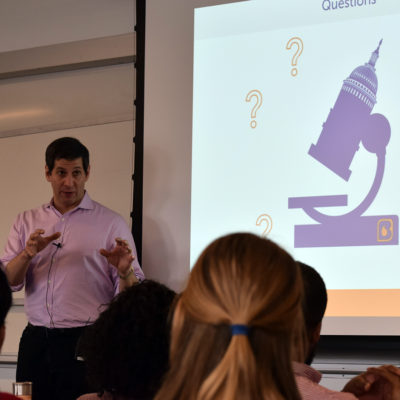How to be a Powerhouse Policy Advocate

Mark Bayer
Advice from Strategic Consultant, Mark Bayer: Scientists often form their own bubble in academia that secludes their activities from the rest of society, especially the political world. It is a fair assumption that scientists do not want to get involved in politics for fear of funding cuts, misinformation, or disputes with stakeholders they are not trained to interact with. Mark Bayer aims to change that narrative and teach scientists how to become advocates for themselves and their work to relevant stakeholders like policymakers. He presented his strategies on becoming a powerhouse policy advocate to students in the Science Policy Bootcamp course at Cornell and what skills scientists have to advocate for evidence-based policy decisions. After 20 years on Capitol Hill, Mark offered the following advice to scientists diving into interactions with policymakers (or anybody outside academia).
First and foremost, recognize that any formal decision contains an informal process behind it. As scientists, we are very privy to using facts and data to drive our point home as that is our native language. This tends to be the situation where scientists will use jargon until everybody’s eyes are glossed over. Every industry and community has their own native language, and being cognizant and speaking that language is vital. Secondly, logic and fact are the strong suit of scientists, but lack impact without a greater context. The goal of advocating is to convince someone why they should care, and emotion provides a powerful narrative to give data driven solutions a purpose that policymakers can easily support. Thirdly, build credibility through common ground and interests. Networking with a policymaker means doing research into what issues they are interested in, where they are from, and what leverage can get your foot in the door. Lastly, understanding the values of the community you wish to influence helps you determine who is the right spokesperson, what cultural context do these people live with, how the community gathers information, and what approaches a scientist can use to influence a policymaker or community.
While scientists may not be trained to interact with policy, we can carry a set of skills that gives us great power. Our ability to deeply research, be persistent, and inquisitively investigate are valuable assets that can be augmented to develop and influence policies that impact our communities.
By Joseph Long, PhD Student, Lammerding Lab, Meinig School of Biomedical Engineering, Cornell University


